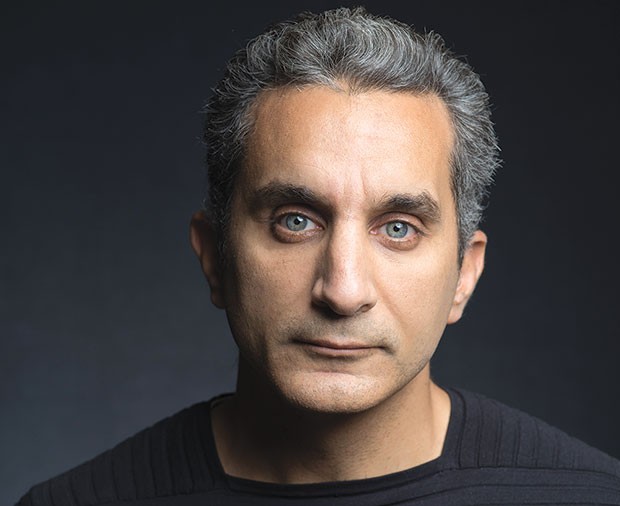When the Jon Stewart of Egypt couldn’t live in Egypt anymore, he moved to the U.S. But now that he’s here, Bassem Youssef keeps seeing all the ways that politics in the two countries are the same.
“The fact that you have thin-skinned dictators who are pretty much offended by any joke is a feature that we are pretty much used to in the Middle East,” quips Youssef by phone. “The demagoguery, the brainwashing, the alternative facts, all has been a stable part of our political life for decades.”
Youssef, 43, a cardiac surgeon by training, was once the quick-witted if unlikely host of AlBernameg, the Daily Show-like satiric news program that was Egypt’s highest-rated TV show. Youssef’s mockery of the government got him arrested and interrogated; in 2014, under a military regime, AlBernameg was cancelled.
Youssef moved to the States last year. He lives in Los Angeles but spoke with CP from New York City, where he was riding a media whirlwind promoting Revolution for Dummies, his new memoir about life in the Middle East during the Arab Spring and the 2011 Egyptian revolution. Last week, Youssef was preparing for TV appearances with Stephen Colbert, Trevor Noah and Samantha Bee, capped on March 21 by a talk at New York’s famous Town Hall.
This Saturday, he co-headlines the Pittsburgh Humanities Festival — one of more than two dozen programs under the theme Being Human. (See sidebar for details.)
Last year, during campaign season, Youssef made a series of short online videos for the Fusion network — interviewing Donald Trump supporters, training Bernie Sanders backers for revolution. Telegenic and fluent in English, he seems a natural at comedy, for which he credits American TV itself.
“Actually, it is quite interesting how sitcoms and American dramas prepare you to live in the United States,” he says. “The only difference is, instead of watching it, you just have to experience it. For example, being on hold for hours when you are in the process of getting medical insurance.”
While Youssef’s Humanities Festival talk is titled “The Joke Is Mightier Than the Pen,” he turns serious when discussing how repression in Egypt foreshadowed political events here.
While Muslims have been targeted in the U.S., he says, “Muslims should not be the only ones who should worry about it, because when racism comes, it really doesn’t discriminate. It doesn’t look at your ID, it doesn’t look at your religion. We have seen Indians being killed and targeted, being mistaken for Muslims. … Under fear, under oppression, the authorit[ies] will find a way to silence whatever dissent it is. Even if you’re a white American, even if you’re privileged, you will not be able to speak against the government, because in the time of war, in the time of battle, in the time of turmoil, any voice of dissent or opposition will be viewed as unpatriotic, un-American and against the will of the people.”
But Youssef says he’s not as worried about Trumpism as all that might make him sound. “If one man could bring down 400 years of democracy, that will be very interesting to see,” he says. “And if the price of [one] election will be the destruction of the democratic establishment, it just means that this has been a very, very fragile establishment.”
Checking in with Bassem Youssef, “the Jon Stewart of Egypt”
Satirist co-headlines Pittsburgh Humanities Festival

Bassem Youssef

